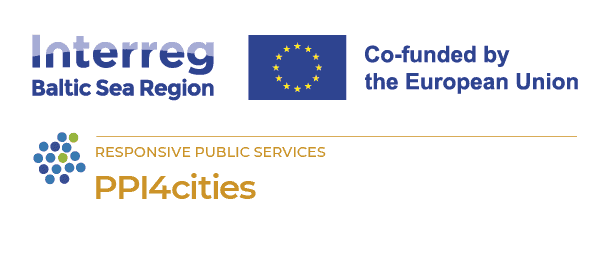
A story behind the PPI4cities project
06 May 2024
I.V.: Good day, Povilas. It’s great to chat about the PPI4cities and have a bit of a retrospective on how this idea of PPI was converted into an Interreg Baltic Sea Region project. But first things first, could you please introduce yourself and your role within the PPI4cities project?
P.B.: Certainly! My name is Povilas and I am an Expert at the Lithuanian Innovation Centre, a Lead Partner in the PPI4cities project. So I am the main person at LIC responsible for running PPI4cities as smoothly and as successfully as possible.
I.V.: Wonderful. To kick things off, could you provide us with an overview of the concept of Public Procurement of Innovation (PPI) in Europe? How does it differ from traditional procurement methods?
P.B.: Of course. Public Procurement of Innovation or as our project name indicates – PPI, entails public authorities leveraging their purchasing power to drive innovation in goods, services, or works that are not yet available on the market. Unlike traditional procurement, which primarily focuses on acquiring already existing solutions, PPI encourages the development of novel products or services tailored to meet specific public sector needs. This approach fosters innovation, stimulates economic growth, and addresses societal challenges by promoting collaboration between the public and private sectors.
I.V.: That sounds promising. How do you envision the prospects for PPI initiatives in Europe, particularly in the context of urban development and smart cities?
P.B.: The prospects for PPI initiatives in Europe, especially concerning urban development and smart cities, are incredibly promising. With rapid urbanization and the increasing complexity of urban challenges, there’s a growing recognition of the need for innovative solutions to enhance urban living standards, sustainability, and efficiency. PPI offers a strategic framework for cities to procure innovative solutions that address their unique challenges, whether it’s improving transportation systems, enhancing environmental sustainability, or enhancing citizen services through digitalization. By fostering a conducive environment for innovation, PPI initiatives can play a pivotal role in shaping the future of urban development across Europe.
I.V.: The PPI process probably requires a lot of funding. Where can those funds come from?
P.B.: Globally, cities spend approximately 6 trillion US dollars annually on public procurement, equivalent to 8% of the world’s GDP. Within the European Union, the public sector spends around 14% of GDP on public procurement, amounting to around €2 trillion per year. Meanwhile, in Lithuania, the €8-9 billion allocated to public procurement constitutes about 11-12% of GDP, depending on the year. This substantial financial resource presents significant untapped potential that could be harnessed through smarter, more innovative purchasing practices. We are not talking about relocating significant additional resources but rather using existing funding more innovatively.
I.V.: Fascinating. Now, let’s delve into the specifics of the PPI4cities project. Could you elaborate on the objectives and key activities of the initiative?
P.B.: The PPI4cities initiative is a collaborative effort aimed at empowering cities in the Baltic Sea Region to enhance their public services and realize ambitious innovation objectives through the process of PPI. Our primary objectives revolve around crafting practical tools and resources to facilitate the uptake of PPI among city stakeholders. These tools are hosted on the digital platform PPI4cities.eu, providing structured content and guidance to support cities in implementing smart city solutions through PPI. Additionally, the initiative serves as a dedicated network for Baltic Sea Region cities, fostering collaboration, knowledge exchange, and capacity building in the realm of PPI. Activities such as peer exchanges, networking, and training sessions are organized to enhance collective expertise and secure political buy-in for PPI among city stakeholders.
I.V.: Impressive. How do you envision the impact of the PPI4cities project on urban development and innovation in the Baltic Sea Region?
P.B.: We anticipate that the PPI4cities project will have a significant impact on urban development and innovation in the Baltic Sea Region. By providing cities with the necessary tools, resources, and expertise to engage in PPI, we aim to catalyze the development and deployment of innovative solutions that address pressing urban challenges. Through real-world testing and evaluation of these solutions in urban settings, we seek to demonstrate their viability and effectiveness, thereby encouraging wider adoption and replication across the region. Ultimately, we envision the PPI4cities project contributing to the creation of more sustainable, resilient, and citizen-centric cities in the Baltic Sea Region.
I.V.: Thank you for sharing those insights. For cities interested in embarking on their public procurement of innovation journey, how can they get involved with the PPI4cities project?
P.B.: Cities interested in participating in the PPI4cities project and initiating their public procurement of innovation journey can visit our platform at PPI4cities.eu. There, they can access a wealth of resources, tools, and information to guide them through the process. Additionally, we encourage cities to reach out to us directly to learn more about how they can get involved in our activities, such as peer exchanges, training sessions, and networking events. We’re always eager to collaborate with cities committed to driving innovation and enhancing public services through PPI.
I.V.: Great. And what other actors might be interested in joining the PPI4cities platform?
P.B.: The platform is focused on three main target groups: already mentioned cities, procurement professionals, and businesses, willing to work with cities in search of the best solutions via the PPI process. So the project involves a wide variety of interested parties and offers tools to deepen competencies and build knowledge.
I.V.: Excellent. Thank you once again for your time and insights. It’s been a pleasure speaking with you.
P.B.: Likewise. Thank you for having me.
Join the PPI4cities project and explore what the PPI4cities platform has to offer here: https://www.ppi4cities.eu/





